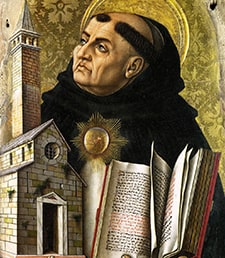Probably the greatest of medieval Christian philosophers, Thomas Aquinas’s major achievement was to synthesize the apparently contradictory philosophies of Plato and Aristotle and show they were complementary to Christian belief. From Plato’s view of Universals in his theory of Forms (see Plato’s theory of Forms), he derived the notion of what he called the essence of things. This, he said, was distinct from its existence: for example, it is possible to describe the attributes of a dragon – its essence – yet still deny its existence. He further argued that since God created everything according to his design, the essence of things must precede their existence. But he also believed that our minds are like a clean slate, or tabula rasa, and took from Aristotle the idea that we acquire knowledge through our senses. While careful to distinguish such ideas from questions of faith, Aquinas did not see them as incompatible. These rational explanations concern the way we learn about the world, but we can still believe it to be God’s creation. Inevitably, it took some time for such ideas to be accepted by the Church.
Free Course in Semiology
A completely and truly free course on Semiology (Semiotics). Learn about the meaning of signs, how and why did the field emerged. What is the relationship between the street signs and the signs that we use every day - words.


